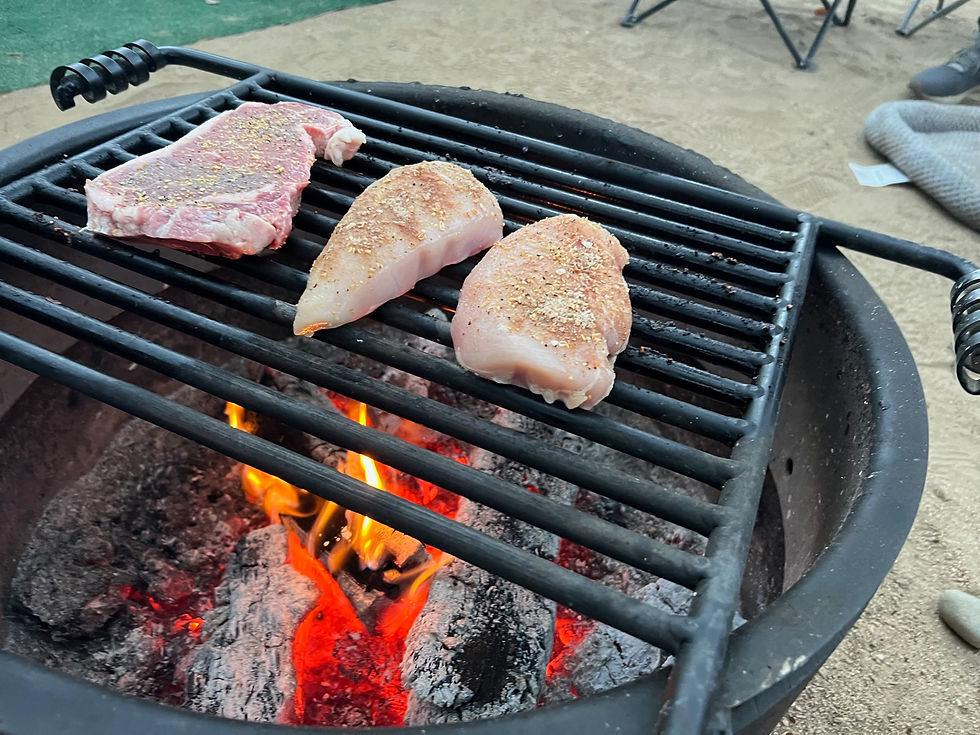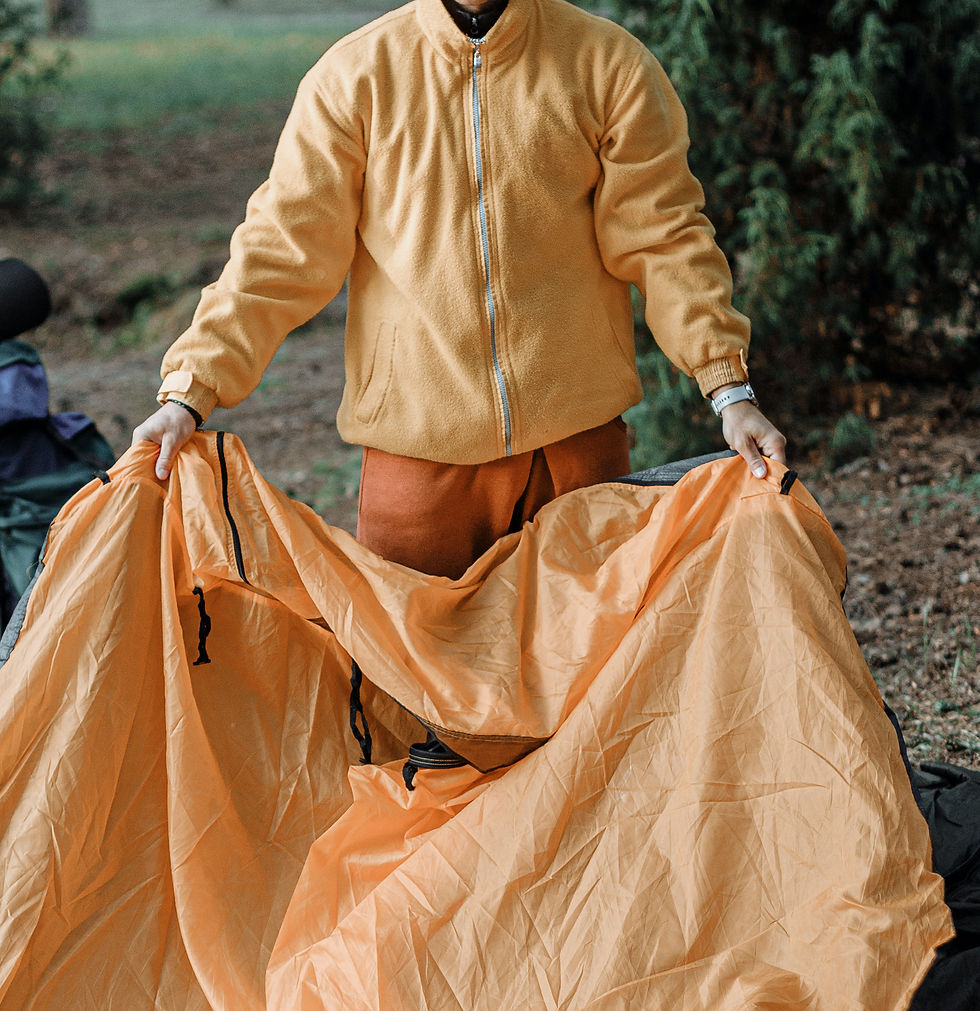Tips for First-timers on Planning a Sustainable Camping Trip & Leave No Trace
- Kern River's Edge Team
- May 2, 2024
- 6 min read
Updated: May 4, 2024
Most campers are familiar with the phrase Leave No Trace, but what if we can do more by focusing on Leaving It Better Than We Found It. Why?
Camping is trending in the U.S. and visitors to developed and undeveloped campgrounds are increasing by the thousands. Camping is one of the most affordable, safe, meaningful ways for families of any size to vacation together. And with more and more folks camping, many first-time campers, comes the potential for overuse. That’s why taking precautions to protect our Earth are so important, after all, we are visiting Mother Nature’s home and it is our job to know how to be a guest who gets invited back, right? How?
Fortunately when you stay at private campgrounds strategic amenities make it much easier to execute your sustainable camping trip. Amenities that make it easier include:
· trash bins
· recycling bins
· pet waste stations
· water faucets
· dish washing stations
· coin-operated showers that encourage wise water use
How to Leave it Better Than You Found It Leave No Trace means just that. You came, you camped and no one can tell that you were there. Your care and concern for leaving an outdoor place better than you found it shows! So what does this look like?
As you were packing up to go home you scoured your camp area for garbage and placed it securely in your trash bag.
Maybe you promise the kids an ice cream if they each pick up 10 pieces of micro-trash! Don't leave it on the ground for wildlife to ingest. Get the kids excited to help care for our Earth.
If camping in a primitive spot, you might have to haul the trash home with you. Yuck! But hey, that is all part of responsible adventuring!
You poured water on your campfire to put it out.
If at a private campground you walked your trash to the appropriate bin, recycling too.
Picked up all pet waste and disposed of it properly.
Checked with Camp Host to ensure campground policies are respected and said goodbye, see you next time!

Micro-Trash are very small bits of trash that when left behind, start adding up over time. Like the twist tie on a loaf of bread. The plastic straw cover on a juice box. Cigarette butts! Bottle caps. Collect all micro-trash and place it in the trash.
Read more: How does micro-trash affect me?
Creating Less Trash Food waste can create lots of trash, especially for group camp outs. To minimize and simplify, start with a menu and make your own food. Prep those hamburger patties or hot dogs in advance and freeze them, wrapped in parchment, inside a re-usable tub or Ziploc. You need less ice plus you can wash out the tub and reuse it again. Check our tips for group camping menus.
Pro-tip: How to keep food cold while camping
Bring refillable water bottles instead of buying cases of plastic water bottles that end up in the landfill.
Instead of batteries, use a USB rechargeable light, with an adapter to your car for recharging. Or think solar. Solar powered lights and showers are super popular, accessible and can be used for many camping trips instead of once.
Dishwash Station Using dishwash stations provided at private campgrounds allows you to easily separate out food waste out and place it in the trash, rather than on the ground, where it attracts wildlife. No dishwash station, make your own with a wash tub, rinse tub and a strainer or colander.
Protecting Wildlife The thought of seeing wildlife during your camp out is exciting and can have unanticipated consequences so do your best to mitigate encounters with wildlife.
Do not leave any food scraps on the ground or in the firepit, place in trash
Use bear-resistant containers when in the back country
Store your trash, food, and cooler in your car or in a park bear locker
In the wilderness if you don’t have anywhere separate to store your food and trash, then use a tree and hoist your goods by rope at least 10 feet above the ground
Practicing Outdoor Responsibility Our children learn from watching us. Sharing and teaching them how to protect and preserve our outdoor spaces will ensure that they in turn get to experience camping in pristine places with their own children. There is much to learn about the outdoors, especially for first-time campers. Seek out information before you go so that you are prepared for things like campfire management and managing waste in the wilderness.
· Managing campfires, a small campfire allow you to relax and put it out easily
· Use locally sourced firewood to ensure invasive pests are not spread
· Know fire restrictions before you visit an area
· Ensure your campfire is “dead out” before you leave
· Use campground restrooms when available
· If you go in the woods, bury your waste, and pile rocks on top so that animals can’t get to it
Read more: Basic Camping Etiquette
Borrow Gear from Friends Campground owners report an increase in “out of the box” camping. Campground staff see hundreds of camping guests roll in to camp, start unpacking their brand-new camping gear right out of the box. The gear has not been tested, nor have the owners practiced setting it up. Giving yourself a little time to unpack, inventory the gear inside your box, and practice setting up can alleviate so many issues later. You might find a part missing from your box and can remedy this with the store where you purchased the item before you camp. Or, you might arrive to camp at dark, but no worries, you have practiced setting up your gear and could set up your tent blindfolded!
Many first-time campers are buying the most affordable items they can find. How is this impacting the Earth? All that packaging is overloading trash systems in campgrounds. Borrowing camping gear from friends or family is a simple solution. You get to try out camping and see if you like it, and, you are saving money while not creating more trash.
Consider repairing instead of tossing. Another trend seen at campgrounds is where campers have a piece of gear that gets broken during the camp out and instead of taking it home to repair, they simply toss it in the trash. We all know that one person who can fix anything. Bring that item home and ask them to show you how to repair it. You learn something new and you get to spend time with a friend.
Pro-Tip: How to camp like a pro
Use Biodegradable Products Using all natural or biodegradable products in the outdoors helps ensure we are not adding to the pollution problem for streams, rivers, lakes, and the ocean.
As an example, Dr. Bronner’s products are biodegradable and vegetable based, so they decompose naturally, plus their containers are made from 100% recycled materials. Natural and biodegradable products to look for include sunscreen, soaps, insect repellents, and toothpaste.
With more and more people enjoying and recreating in our outdoor spaces it is even more important to learn and use sustainable practices to protect our pristine and wild places. For all the first-time campers out there we hope that our tips and insights help make your first or next camping trip a memorable, treasured experience that encourages you to come back again and again.
Experience the beauty of the Kern River this spring and enjoy 25% off your Kern River camping fee when you book two consecutive nights, for camping before May 15, 2024. Camping discount automatically applied on new camping reservations for now through May 15, 2024. Reserve soon so you don't miss out on this limited time offer!
Campers-Who-Care
Thank you for being a Camper who Cares! Planning for success in the outdoors includes little changes like packing trash bags so that your group can leave our wild spaces cleaner than you found them. Think scavenger hunt and have everyone in your group canvas the area you have just used whether it be for "day use" or overnight camping and get everyone to participate in leaving the space better than you found it. This teaches and mentors campers of all ages to respect and treat the outdoors with the care that it deserves.
Always practice Leave No Trace (en Español) principles and pack out what you pack in. See our park's Kern River camping etiquette tips.











Comments